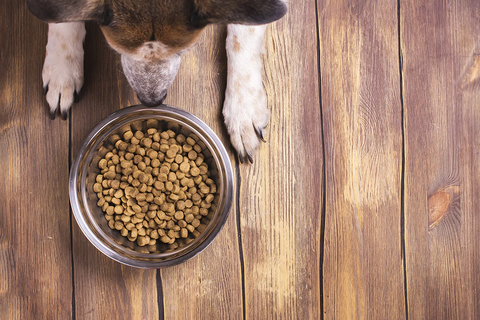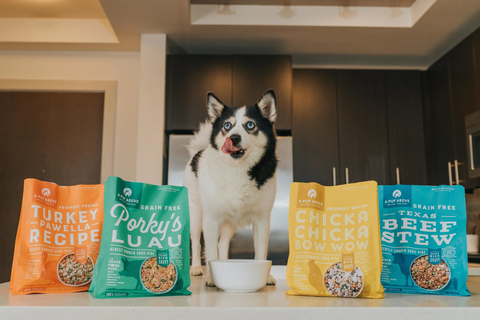
If you're confused about whether dogs should get wholesome grains in their bowl, you're not alone. The short answer is both types of formulas offer benefits. For optimal health, you can rotate between grain-free and grain-inclusive as part of your pet's feeding plan.
Rotational feeding gives your dog nutrients that build a healthy body and a healthy gut. So when you're selecting bags and cans of food, including a mix of grain-inclusive and grain-free is a great option!
In the following blog, we'll explain the popularity of the grain-free formulas along with some misconceptions, and why it's safe if you choose to work grain-inclusive foods into your dog's rotation.
Grain-Free Diets
Grain-free dog food will not include ingredients like wheat, rice, corn, barley, oats, soy, or rye. There are some pros and cons dog owners should consider when looking into grain-free dog food. If your dog has a grain allergy, of course, a great option is putting them on a grain-free diet. Additionally, grain-free pet foods could be beneficial if your dog has digestive issues or yeast overgrowth since carbohydrates can be difficult for some dogs to digest.
Dog foods with grains may use wheat gluten or corn meal, which are cheap fillers that have little nutritional value and may reduce the quality of the kibble or wet food. We make sure any grain-inclusive formulas stocked at The Brookside Barkery are high quality and not those listed above.
Why feed a Grain-Free Diet?
- Many pets experience grain allergies that can present themself as chronic itching, excess shedding, loose stool, or frequent infections. By eliminating the source of the allergen in their diet, most pet parents notice a major change in their
- Encourages weight gain in active dogs. Grain-free diets will naturally be higher in animal-based protein and fats. This helps bulk up pets who need those extra calories and amino acids. This is also an optimal diet for active pets who burn through calories quickly and can benefit from a stockpile of nutrient dense calories.
- Good for dogs with diabetes and cancer. A diet rich in simple carbohydrates can raise your dog's blood sugar levels if it's diabetic. Carbohydrate can also lead to the overproduction of insulin and weight gain, eventually resulting in diabetes.
The Drawbacks
On the downside, grain-free dog food might not be the best choice for your pup if they can easily digest grains. If you have an older less active dog grain-free food can lead to weight gain for dogs with a sedentary lifestyle. Older and less active dogs do not need the energy that a protein-rich diet provides.

Grain Inclusive Diets
The Grain inclusive diets we will have stocked at The Brookside Barkery will include quality grains such as: Oats, brown rice, pearled barley, millet, quinoa, and other ancient grains.
Why Feed a Grain-Inclusive Diet?
- Pets who are not considered "active", overweight, or a senior do not always thrive on protein rich grain-free diet. If this is the case, a quality grain inclusive diet that is lower in protein and fat might be more beneficial to them.
- Grain-inclusive diets can also help with recovery from an upset tummy. Occasionally our pets get into something they should not have or come down with tummy issues. In this case, a quality grain-inclusive diet could be beneficial. Grains will add soluble fiber to their diet to firm up their stool. The lower protein levels in grain inclusive diet can give the stomach time to recover and re-regulate.
- These diets are a more cost effective approach to feeding your dog high quality food. This is because typically these diets are lower in cost than their grain-free counterparts. Grains can be inexpensively sourced compared to non-grain ingredients that are used in substitutes.
The Drawbacks
For some dogs, grains can be the cause of certain health issues like skin irritations, allergies, eye and ear infections, digestive issues, among others.
Rotating
Do not be hesitant to rotate between the two options of grain-free and grain inclusive your pet does not suffer from grain allergies or a severely sensitive stomach, then feel free to transition them between different foods, some with and some without grains. Rotating has many benefits:
- Reduced risks of food related allergies.
- Reduced pickiness.
- Grater variety of nutrients.
- Opens-up options in case your "go-to" food is not available.

So, Which One is Right for My Dog?
Every pet is different, and each requires a uniquely different dietary need. It is important to understand what is needed to enable your pet's well being. At the end of the day wholesome nutrition is what is important. Whether you decide grain-free is right for your pet, or if you want to stick to grain inclusive we always recommend choosing a formula with minimally processed ingredients, a protein source high up on the ingredient list, and a reputable brand you can trust.
At the end of the day, we all have one common goal: for our pets to thrive, and nutrition plays a huge part in making that goal possible.






